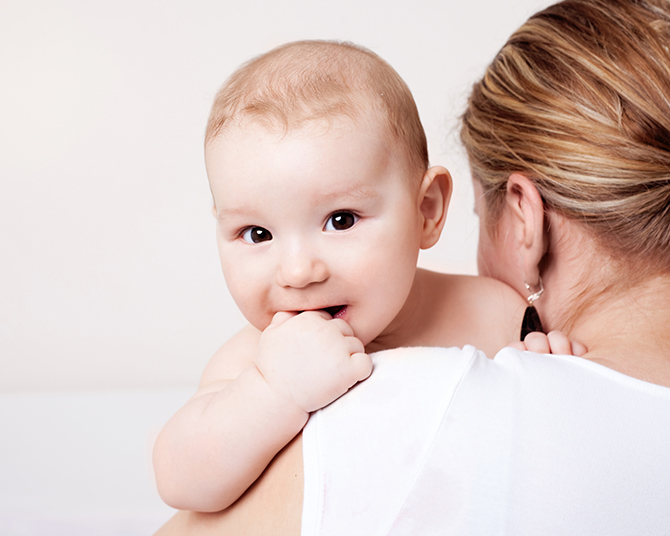BANISHING THE BABY BLUES

By Dr. Carly Snyder
Recently celebrity model Chrissy Teigen revealed her lingering struggle with postpartum depression after the birth of her daughter Luna. She is not alone. Did you know that postpartum depression, anxiety and psychosis affect one in four women? However, what is most amazing is the stigma around mental illness, and cultural myths of effortless motherhood keep so many sufferers from coming forward.
We recently met with Dr. Carly Snyder, a reproductive and perinatal psychiatrist who works with women struggling with emotional symptoms throughout their reproductive years. “Women often come to see me at pivotal points in their lives to address anxiety or depression. Some women are struggling with their mood and need to address things in advance of pregnancy, sometimes while undergoing fertility treatments, whereas other women are already pregnant or postpartum. We work together to minimize mood symptoms while simultaneously reducing risk to a future baby and mom. Other women are currently stable and feeling good, but have a history of a psychiatric illness like depression, anxiety or bipolar disorder and hope to conceive shortly,” she said.
Synder also explained there are still others on medications. We discuss the options, risks, and benefits of various forms of treatment, and together map out ways to maximize their health and wellness in advance of, during, and after pregnancy.
What is your approach to treating mental health and all aspects of a women’s life when creating a treatment plan?
I believe in a holistic approach to mental health. I always strongly encourage lifestyle modifications, such as dietary changes, exercise, and improving sleep hygiene—I am always asked if there is any one thing that can make or break a woman’s mood and the answer is sleep! There is no treatment effective enough to overcome the adverse effects of sleep deprivation, and nothing is as restorative and mood enhancing as a good night’s sleep and being consistently well-rested.
• Dietary changes are also important to minimize inflammation, a cause of or an exacerbating factor increasing anxiety for some women. Additionally, I hunt for potential biologic causes for a woman’s mood symptoms, such as low vitamin D and B-12 or hypothyroidism. By checking labs and examining for abnormalities, we can determine ways to improve a woman’s overall health and as a result also improve her mood and energy.
• Psychotherapy is also incredibly helpful for women struggling with mood symptoms, so I will often either see a woman in therapy myself or refer her to a respected colleague if she is not already in treatment.
What can be done for more severe depression?
I believe in the benefit of medication for women struggling with more moderate to severe illness. Choosing the right medication to minimize symptoms requires me to work in close collaboration with the woman and understand her history, her symptoms and to know the most modern literature and research.
I provide women with options and information and allow them to decide how to approach treatment—my role is not to decide for them, but to give them the tools to make a well-informed, educated decision. Every woman deserves to feel emotionally stable and healthy in advance of, during and after pregnancy. My goal is to empower my patients with knowledge and tools to feel their best in short and the long run.

Why is depression considered a women’s health issue?
One in four women will experience depression in their lifetime. Pregnancy is not protective against depression or anxiety, and sadly 12-to-20 percent of pregnant women experience clinical mood symptoms during their pregnancies. Untreated depression and anxiety during pregnancy are potentially dangerous for mom and her baby as they are associated with poor self-care, decreased attendance at routine prenatal care and increased drug and alcohol use. It results in preterm labor and delivery, increased risk of gestational diabetes and pre-eclampsia, traumatic delivery and C-sections, poor fetal weight gain... the list goes on.
Women who are depressed and anxious in pregnancy often do not improve with delivery, which makes sense given the profound drop in hormones and the new stressors that come with a newborn including sleep deprivation, the physical toll of delivery with little time to recuperate, and the newfound responsibilities of caring for an infant.
What can happen to a woman with severe depression?
Sadly, in its most severe form, depression is deadly. Suicide is a leading cause of death in the first year postpartum, accounting for up to 20 percent of maternal mortality in that first year. Untreated depression and anxiety are associated with impaired bonding, lower likelihood of successful nursing, shorter duration of nursing, and various behavioral and developmental consequences for a baby. Not to mention that some research suggests that exposure to untreated illness during and after pregnancy is associated with poor sleep for infants through two years of age. Postpartum psychosis, considered by most to be a form of bipolar disorder, is associated with 5 percent suicide rate and 4 percent infanticide rate. Thus postpartum psychosis is considered a medical emergency requiring hospitalization immediately.
Beyond the scary statistics, I remind women that being pregnant and having a new baby are incredible, unique times in a woman’s life—stressful, yes, but still incredibly rewarding and undeniably beautiful when mom is emotionally well enough to enjoy the moments. Depression and anxiety rob women of the ability to enjoy the incredible journey of pregnancy and the indescribable joy of cuddling your infant. Parenthood is an amazing experience, and there is no reason why moms or their children should suffer the consequences and lose the wonderful experiences because of untreated mental illness.
What is being done today to help women with mental health conditions?
Thankfully, there is an increasing understanding over the past few years that experiencing mood symptoms during or after pregnancy is not something to feel guilty or ashamed about; women are just as worthy and equipped for motherhood if they suffer from mental illness, and can feel well and be happy with proper support and treatment. Celebrities speaking out about their personal battles with postpartum depression has been instrumental in normalizing the experience. Rather than remaining quiet and ashamed, by speaking out about their experiences, celebrities have allowed other women to be open about their emotions and ask for help.
Advocacy groups such as Postpartum Support International have worked tirelessly to improve understanding of perinatal mood disorders for women and their families while simultaneously teaching providers how to adequately treat women in these situations. I am the Research Chair on the Board of Directors for Postpartum Support International, and can personally attest to the tireless work by PSI to improve understanding and increase the availability of well-trained providers on behalf of all women suffering from perinatal mood and anxiety disorders all over the world. Additionally, positive steps have been taken by states such as New Jersey and New York through mandated screening for depression during and after pregnancy to help increase identification of women suffering and refer them to treatment. Our society still has ways to go before we can comfortably say there is no longer stigma surrounding mental health conditions during and after pregnancy. However each year brings positive growth and a greater appreciation for the illness and support for treatment, and that is a beautiful thing for moms and their families.

Carly Snyder, MD is the Clinical Course Director for the Mount Sinai Beth Israel Senior Reproductive Psychiatry Elective and holds voluntary faculty and teaching appointments at Beth Israel Mount Sinai and New York Presbyterian/Weill Cornell Medical Center. Dr. Snyder is a regular contributor to the Huffington Post on her blog called MD for Moms. She has a weekly radio show also named MD for Moms on TuneIn Radio and the BBM Global Network. She is regularly quoted as an expert in women’s mental health and wellbeing, most recently in Cosmopolitan, Reader’s Digest, The New York Post and Self.



